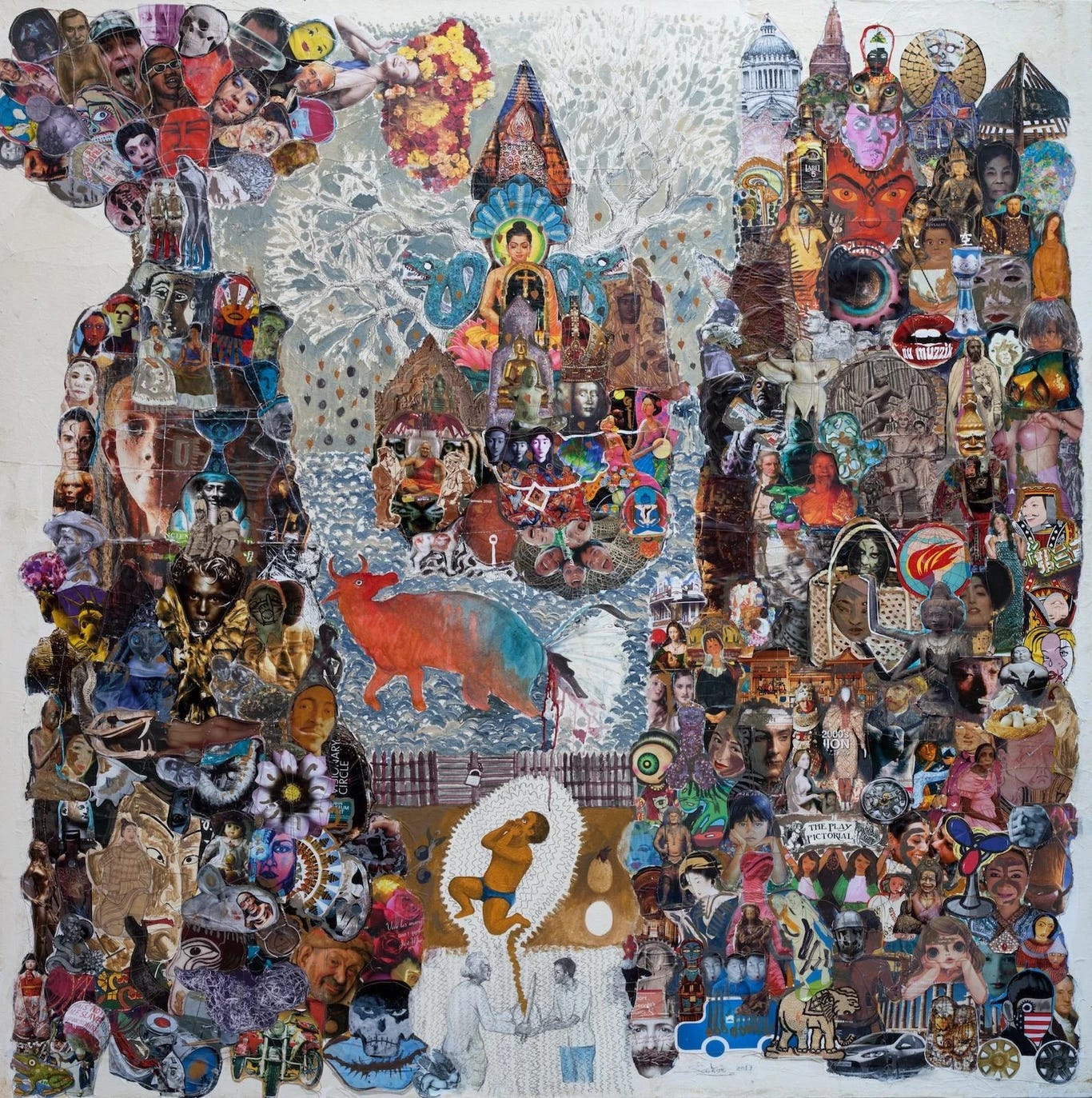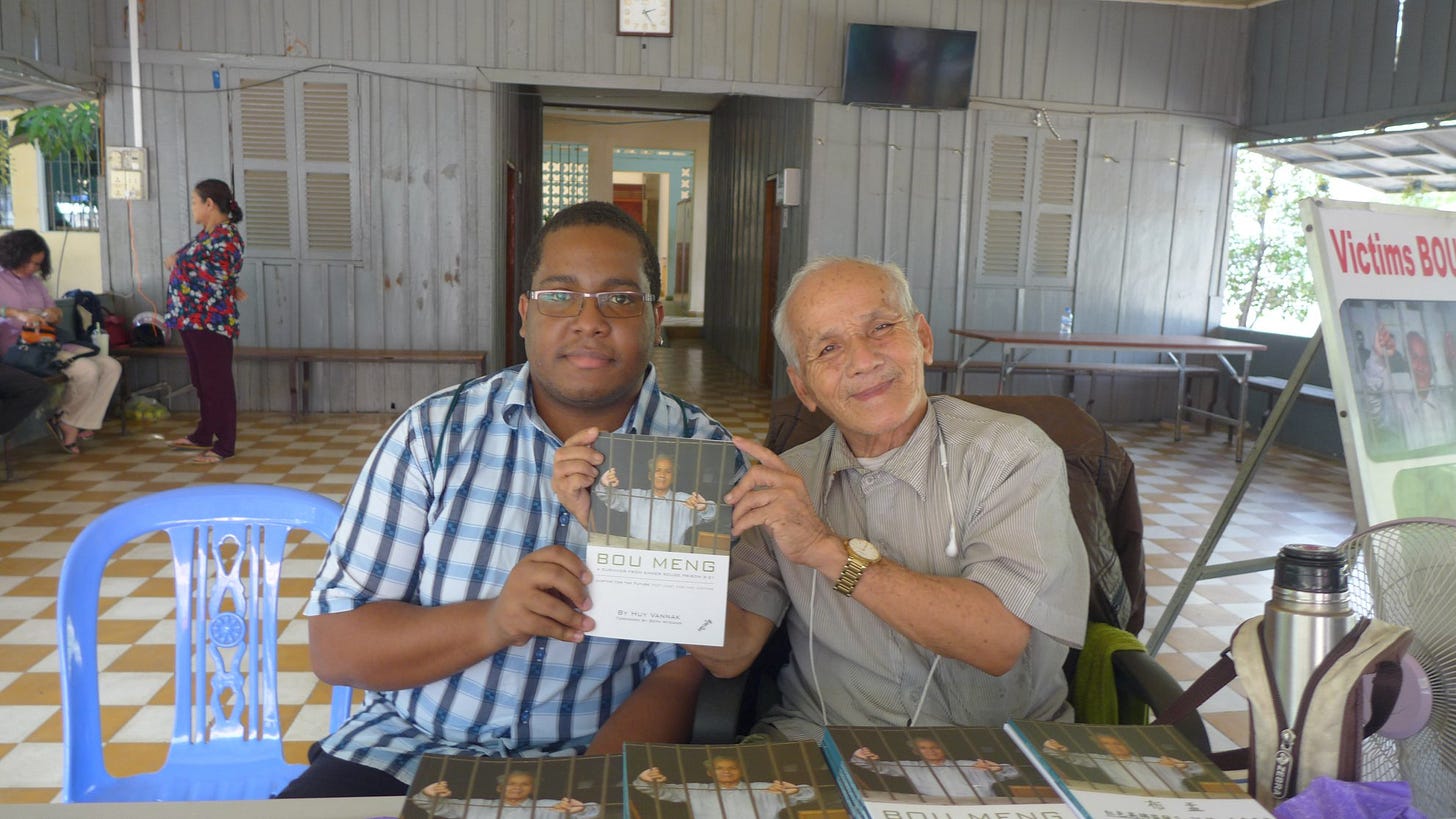Note: I used to write a fair amount about Cambodia - long story. I wrote this short piece in 2018 but decided to republish it here. I also wrote a book chapter on monetary policy in Cambodia. It is not commonly known that Cambodia is de facto dollarized. I’ll be writing more about dollarization in Cambodia in the near future.
In a recent opinion article, Nobel Prize Economist Robert Shiller - whom I deeply admire- wrote that “eliminating money was impossible to do” and no Communist state was ever successful at abolishing money. He is uncharacteristically wrong on both counts. During the three years, eight months, and twenty days of anguish and calamity that characterized the demented regime of the Khmer Rouge in Cambodia, the Communist leadership demolished the Central Bank with explosives and abolished all use of money.
I met Bou Meng in Phnom Penh on a recent visit. He is a former Cambodian prisoner of the Khmer Rouge in S-21, the notorious torture center - now a genocide museum. When asked about this period, he remembers Riel banknotes “scattered on the ground like pieces of litter.”
Cambodia is the only country in the modern era to have had money, had that money abolished, and then had money reinstated. Shiller, in the article mentioned previously, mentioned—without detail—that Marxist Communism supported the idea of societies without money. This, of course, is correct. But I should emphasize that Marx went beyond just supporting the abolition of money. It was central to his philosophy.
The Cambodian experience of a society without money has been discussed before here and here. But these authors only mention in passing that the leaders of the Khmer Rouge, namely Saloth Sar (Pol Pot), Son Sen, Khieu Samphan, and others, potentially sought to follow strict Marxist doctrine regarding money, which led to the abolition decision. They did not explicate exactly what the Marxist doctrine is and why it was considered so integral to a strict and absolute application of Communism. In this blog, I shall offer an explanation of the Marxist origins of the Khmer Rouge’s non-money policy.
The leaders of Democratic Kampuchea became devout Marxists after ingesting the works of Marx and Mao while they were in their early twenties at a university in Paris. The young leaders were among the first Cambodians to go to Europe for higher education. During their time at university, while being taught about Marxism by their professors, Pol Pot and Samphan became active members of the French communist party since the French communists, at that time, supported an independent Cambodia.
Samphan, who later became Head of State during the Khmer Rouge regime, wrote his PhD dissertation on applying Marxist economic theory to specific problems of Cambodia while at the University of Paris. He argued that Cambodia was being exploited by capitalist countries like France. This fueled Cambodia’s dependency on France since its products were exported to France, and the local economy did not have the ability to grow in a significant way. Samphan argued for an “inward focused” development policy for Cambodia; meaning that the country should be able to become self-sufficient if it cuts ties with capitalist countries. This was the economic thinking that was present in the Khmer Rouge leadership from early on.
When they ultimately gained power after seizing control of Phnom Penh from the Lon Nol regime - after Lon Nol completed a coup against Prince Sihanouk - the Khmer Rouge wanted to show the world, but primarily the Soviet Union and China, that the little country of Cambodia could be the world’s purist site of Socialism.
Pol Pot, according to Sheridan Prasso, was very critical of those larger nations for deviating from their Marxist ideals:
Looking at Socialist countries that have had their evolutions already and examine their ways of living, we see that there is collectivism, but not in ways of living, which remain individualistic in many cases. For example… [the Chinese] still have monthly salaries; they still have money to spend. In this way, every person thinks only of saving money to spend on food to eat his fill, to buy clothing and so on…. Standing on these observations, we will not follow this path at all. We will follow the collective path to Socialism.
Mao Zedong had considered abolishing money in China during the Great Leap Forward but did not do so because of the potential for social upheaval. Similarly, in the Soviet Union, Stalin regarded the abolition of money as a kind of deviation from the revolution.[1] In both instances, the bastions of Socialism only flirted with the Marxist principle of a moneyless society, but neither of them concretely implemented that policy.
Since the Khmer Rouge did abolish money, the question may become: Were they the ones to strictly follow Marxism? Or, in other words, was Democratic Kampuchea the only true Marxist state? The answer to this requires looking at what Marx thought about money and why it was central to his socialist principles.
It may seem obvious to search Das Kapital for Marx’s ideas on money, but I think those ideas are more explicit in his earlier works that build up to Das Kapital. Marx’s first concrete treatment of the money question was made in Grundrisse der Kritik der Politischen Okonomie (Fundamentals of Political Economy Criticism), or simply Grundrisse, 1858. And earlier still did Marx begin to show his anti-money philosophy in a short essay he wrote in 1844 titled ‘The Power of Money.’
However, to understand Marx’s view of money, it is necessary to understand that labor was the core of human life for Marx. His oft-maligned - and rightly so - labor theory of value claims that the products of human labor - commodities - do not in themselves have real value. Commodities only derive value from the labor that goes into their production. However, per Marx’s view, in capitalist societies, people tend to believe that commodities themselves have value while disregarding the value of human labor.
If people subjugate labor to commodities, human life (“Gattungswesen”) itself is subjugated to commodities. He considered this a perversion of human relationships since it obscures the real essence of society. In Marx's worldview, capitalists aim for the production of commodities. That is why those capitalists divide people into cogs of the grand machine of capitalism. That division of labor was a curse brought upon humans only to optimize the efficiency of commodities production.
The “working class” was the means of the capitalists to further their wealth. Marx then claims that people began to forget that their labor produces true value. This amnesia is caused by the tendency to price commodities and exchange them for other commodities using money. Money places an exchange value on commodities that is too far abstracted away from the human labor (the “true value”) that went into these commodities, leading to a persistent dilution of the value of human labor.
Marx saw money as a tool of distortion and separation. He argued that a person’s individual abilities, skills, and the rewards they gain from meaningfully contributing to society can be artificially altered because he can use money to gain things that he may not deserve by his own merits or his social relationships with other men.
Money implies the separation between the value of things and their substance. Money is originally the representative of all values; in practice this situation is inverted, all real products and labours become the representative of money. [Grundrisse]
When I read these statements from Marx, they always remind me of the Christian theological doctrine of the demon. The term demon is an adjustment of the Latin daemon, which comes from the Greek daimon, originating from Proto-Indo-European dai-mon (“to divider”) of the root da (“to divide”). In the early Church, and still present in Biblical exegesis, particularly reading Paul’s letters to the Romans, the demon symbolizes, and is the root source of, separation: man from man, man from nature, and ultimately man from God.
It seems that Marx divorced the concept of separation from demons and wedded it to money. All of the human failings that Christianity attributes to demons, Marx attributes to money.
Marx contends that without money, people would need to cultivate “real” attributes in themselves instead of “merely” buying them. If money can bypass some personal failing, then this is a perversion of society because it distorts human relationships.
“Do not I, who thanks to money am capable of all that the human heart longs for, possess all human capacities” Does not my money, therefore, transform all my incapacities into their contrary?.” (Manuscripts, 1844)
From here, Marx used this curious “rationalization” to propose that money is the ultimate agent of separation in society:
“If money is the bond binding me to human life, binding society to me, connecting me with nature and man, is not money the bond of all bonds? Can it not dissolve and bind all ties? Is it not, therefore, also the universal agent of separation?”
For Marx, money is de-monized. There can be no true and pure Socialist nation without the abolition of money. In quoting Boisguillebert in Grundrisse, Marx proclaimed t“money is the hangman of all things, the moloch to whom everything must be sacrificed, the despot of commodities.” Money was not a by-the-way contention of Marx; it was fundamental, if not central, to his entire critique of the capitalist mode of production.
Pol Pot understood this. He wanted to build a society of such pure Socialism that people worldwide would pilgrimage to Cambodia to see the reality of an ideal Marxist society. The decision to abolish money may have been the root of many of the Khmer Rouge’s evils. Without money and effective trade, there is no possible freedom.
Phillip Short has made the point that even in North Korea, people had little money; they were paid wages. They were able to retain some choice as to how to manage their life; though how little choice it was. But that minuscule area of free choice - buying something for your children to eat - did not exist anywhere in Cambodia. Pol Pot succeeded in what other Marxist leaders did not dare do.
Cambodia had no money, private property, or trade during the Democratic Kampuchea period. This is almost wholly unknown to most Western-trained Economists. The rationale for this result was not a deviation from Marxism but rather the strict application of its elements.
Notes:
[1] Prasso, Sheridan T. “Money and Monetary Policy in the Soviet Union, 1945-1964.”


